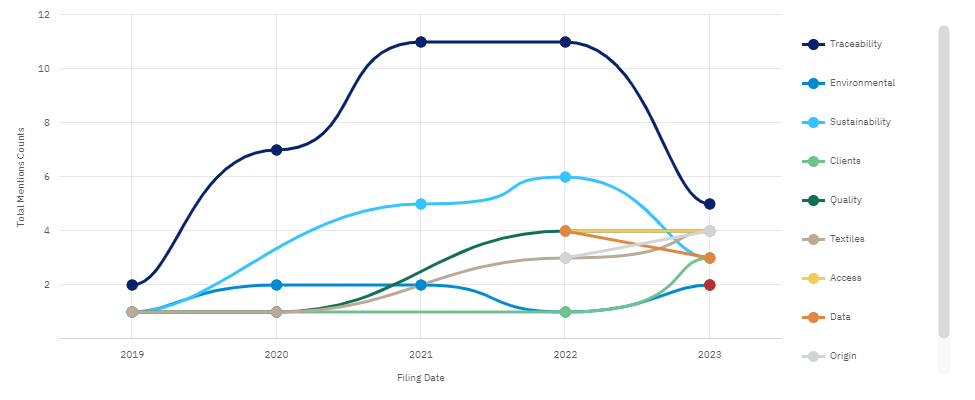Apparel company filings data by GlobalData shows "traceability" was the most-used keyword in the apparel industry over the last five years (from September 2019 to 2023).
The next most-mentioned keywords were "sustainability" and "quality" for the given period, which is what apparel companies hope good traceability will be able to demonstrate. However, this trend changes in September 2023, where the themes "origin," "access," "textiles" and "quality" share second position behind "traceability,"
Traceability leads the way in apparel company filings over last five years

This further supports the growing importance of traceability for apparel companies as consumers demand to know everything about a product from its origin to when it reaches the point of sale and beyond.
GlobalData apparel analyst Pippa Stephens tells Just Style she expects that more retailers and brands will start significant investments in this space to give shoppers greater confidence in their products and become more competitive.
Stephens says: "As consumers continue to become increasingly concerned about the sustainability of their apparel purchases, due to growing awareness of the environmental impacts of the fashion industry, textile traceability is going to become even more crucial."
She also suggests cross-industry collaboration will enable retailers to benefit from the extensive expertise of specialist traceability organisations and believes an outside perspective will allow for any issues to be highlighted more effectively.
Swiss traceability company Haelixa received financial support from the Zürich Silk Association (ZSIG) last week (5 September) to aid its mission of using DNA markers to create full supply chain transparency.
Speaking exclusively to Just Style, a company spokesperson explains that physical traceability is the link to validating the materials used.
The spokesperson states: "Adding physical markers to material keeps the data and information connected through the entire value chain. Digital traceability supports the documentation and does not attach to the data directly, so there can be risks in information gaps. For this reason, it makes sense that manufacturers and brands minimise their risk by using both digital and physical tools, depending on their sustainability goals."
Digital product passports (DPPs) are also growing in popularity for ensuring complete traceability.
Supply chain traceability provider TrusTrace is participating in the Trace4Value project to pilot them, and social enterprise CottonConnect's partnership with Haelixa aims to deliver digital and physical cotton traceability throughout the supply chain.
A digital product passport is defined as a digital record or document that contains comprehensive information about a product's lifecycle, from its inception to disposal or recycling. Therefore, it can be used as a valuable tool for enhancing traceability and also as a scorecard for companies looking to make their processes more sustainable.
In April, EU Environment Committee Members of Parliament (MEPs) recommended 'digital product passports' as one way to combat excessive textile production and consumption.
The surge in laws concerning sustainable and circular practices, calling for transparency in the apparel industry, has inadvertently led to the need to make supply chains traceable. With DPP becoming a new apparel industry buzzword it will be interesting to see how brands adopt it.
Our signals coverage is powered by GlobalData’s Thematic Engine, which tags millions of data items across six alternative datasets — patents, jobs, deals, company filings, social media mentions and news — to themes, sectors and companies. These signals enhance our predictive capabilities, helping us to identify the most disruptive threats across each of the sectors we cover and the companies best placed to succeed.















